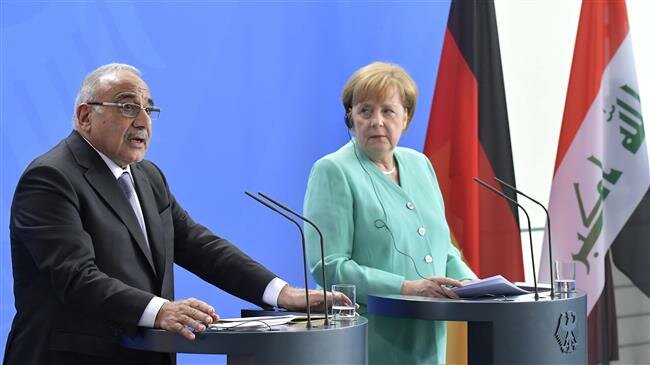Iraqi Prime Minister Adel Abdul Mahdi has warned that even though the Takfiri Daesh terrorist group has been militarily weakened, it has not been defeated and remains a potent threat around the world.

“Daesh is not just a small organization, itís widespread and will try to put confidence back in its militants and carry out acts such as those in Sri Lanka,” Abdul Mahdi said at a joint press conference with German Chancellor Angela Merkel on Tuesday.
A series of coordinated bombings on Easter Sunday rocked Sri Lanka, killing at least 253 people and wounding 500 others.
The attacks targeted three churches as well as four hotels in the capital, Colombo.
Daesh later claimed responsibility for the bomb attacks. “The perpetrators of the attack that targeted nationals of the countries of the coalitions and Christians in Sri Lanka before yesterday are fighters from Daesh,” the terror group said in a bulletin posted by its Aamaq news agency.
The Iraqi premier also pointed to the appearance of the elusive leader of Daesh, Ibrahim al-Samarrai aka Abu Bakr al-Baghdadi, for the first time in five years in a propaganda video.
"One and a half years ago, Daesh controlled large areas in Iraq and Syria, and now Baghdadi appears in an isolated, unknown location," Abdul Mahdi commented.
"He did not seem to be among his followers like the first time in Mosul", he said, referring to a July 2014 video in which Baghdadi announced the birth of the groupís so-called caliphate across swathes of Iraq and Syria during a speech at the Grand al-Nuri Mosque in the strategic northern Iraqi city.
“Daesh has not completely disappeared but suffered painful blows,” Abdul Mahdi underscored.
He noted that the Takfiri terrorist group “was broken, but if little cells are left, it could reactivate and resurface and commit painful attacks.”
Merkel, for her part, said Baghdadi’s appearance in the 18-minute video was a sign that “we will remain occupied for some time to come with the question of how Daesh can finally be defeated.”
The former Iraqi prime minister, Haider al-Abadi, declared the end of military operations against Daesh in the country on December 9, 2017.
On July 10 that year, he had formally declared victory over Daesh in the strategic northern city of Mosul, which served as the terrorists’ main urban stronghold in Iraq.
In the run-up to Mosulís liberation, Iraqi army soldiers and voluntary fighters from the pro-government Popular Mobilization Units (PMU) – better known by the Arabic name Hashd al-Sha’abi – had made sweeping gains against Daesh.
LINK: https://www.ansarpress.com/english/10972
TAGS:


































 online news tv
online news tv




